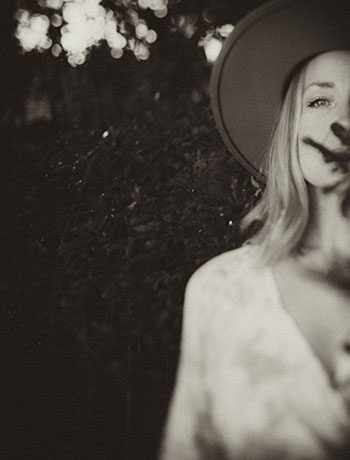So, I woke up with a pair of underwear next to me in bed. I mean, they were my own underwear (from the night before?), but still: a crumpled up pair of underwear in bed with me just made me feel weird. Especially because I probably snuggled with them at some point during the night, and had no idea. Adding to this, it’s only now, sitting upright in bed at 4:15am with coffee in hand, that I realize my nightgown is on inside out. This is an awful lot of nighttime-wear complications for one morning.
It seems fitting, though; last night, laying in bed and texting my sweetheart (we have some of our best conversations over text, I think owing to the fact that so much of our relationship over the last few years found us in different parts of the country) I started crying. (He wasn’t breaking up with me.)
Ever just have moments (years) where, without even realizing it, there’s a metric boat load of unprocessed / un-felt emotions sitting on your chest, and the moment just a feather’s worth of weight is lifted, the floodgates open and you’re bawling? It was like that; we said some true, loving things, and BAM! I’m sobbing. Five minutes later, it was over and I was back to reading Harry Potter and the Chamber of Secrets.
And then, of course, I looked at the date. It’s the 15th. Two months ago, my sister died. (I’ve been writing about it some on Instagram.)
Some days, I feel straight-up normal. Functional, even. But if I’m honest, the last couple of months have been the typical parade of the grieving person: I am awake, alive, surviving in a world that has kept turning despite my sister’s absence. My body (no one’s body) can hold and express and process constant grief, so after a time, I began to think about other things. Do other things. Go to work, have conversations, laugh, try out a new brand of dog food for my dog — and then, like a barrel of hot coals coming down on me while I stand innocently in my kitchen, I remind myself to ask Christiane about something at the same moment I see her picture (the one they handed out at her memorial) on my refrigerator, and I’m gone. I am only, in those moments, the hurting insides of a little sister.
Those are the moments that whatever “unexplainable” bad mood (or general inability to handle life) I was just in reveals itself as the undercurrent of grief that I am actually in. And then I have a lot of compassion for myself. We forget that can still be feeling a thing even when the world demands we not be feeling it out loud and in front of everyone all the time.
And actually? This is happening all the time, to literally everyone: The body is processing (trying to, at least) more slowly — and more honestly — than we are at a conscious level. It’s why burning your toast, on some mornings, is not just burning your toast; it’s your daddy issues, that fight you had with your husband and how he makes you feel like an inadequate mother and why don’t my pants fit me anymore??!!?!
The thing is, I know this. It’s my job to know it for other people, but when you’re sitting squarely inside your own canister of transformative grief (or Big Life Thing of any kind, often entailing some grief), the edges are blurred (there are no edges) and one moment rolls into the next and no barometer goes off announcing the transition from Generally Okay, Normal Person to Inconsolable Grieving Person. In the moments I resurface as whole, and all the facets come into view (I’ve just had a complete meltdown) I have so much more perspective. (Ohhhh, no wonder I’m tired all the time / can’t do my dishes / have zero bandwidth for anyone’s bullshit.)
Okay, I always hate doing dishes. That’s not grief, that’s just me.
My point is that, while I realize we can’t always will ourselves into processing grief (or anything) on a schedule, the reintegration of all parts of ourselves after a time (even just a few days) of fragmented existence can generally bring much-needed relief. If you’ve ever felt crazy, and then had a complete come-apart and ugly cried for a little while, you also probably emerged with a little bit of perspective, and felt a little more sane afterwards.
This is because, while not every brain or body allows for it due to genetics / conditioning, ultimately, the feelings that arise from intense experiences are actually, in their rawest form, vehicles for transformation. Not having the chance to do what’s natural for us and actually feel the feelings, process and then integrate them into our world view, we tend to hunker down into survival mode — feeling fragmented because our conscious selves are doing one thing, but unconsciously (at the body level) we are are on a totally different channel.
It’s amazing how sane and whole I feel after a weekend with a girlfriend, lounging by the pool and talking and crying and laughing and feeling safe and held by the world, because there is the freedom to be exactly what I am in any given moment. This is flow. Pit that against the angst of a day job in a windowless office, and I am barely capable of saying my name right (I actually develop a stutter sometimes when I’m really anxious).
All of this is true. And. I believe we have what we need, all the time. Even when it’s not what we (think we) need (or want). In the months leading up to — and in the weeks since — losing my sister, this has become annoyingly, beautifully clear: It’s always happening. It = life. Your life. For you, in support of you… but that doesn’t mean you won’t have to rally to see it, believe it, and do the work that’s yours to bring yourself into harmony with your truth.
I think we forget that part of what we celebrate when we really arrive somewhere meaningful is that we learned how to get there. Obviously, the death of my sister is unique; it’s not a crappy circumstance I just need to learn how to climb out of. I’m not trying to side-step the necessity of this process, here and now, and what it holds for me and who I’m becoming. Grief is not a learning curve; grief and the loss of someone or something can’t be reduced to something that needs triumphing over. Loss like this changes the fabric of your being — who you step into a room as, and what you’ll say as that being every time you open your mouth or do your work in the world. For me, at least, this is that.
And. I am not forgetting that this is part of my story now, and while it’s the hardest of hard, it’s also meaningful in ways that stretch out and around the singularity of the loss. I haven’t only lost my big sister; I have been shown a gallery of possibilities, remembered things about myself and about the nature of love, brought to the edge of everything I thought I could feel and been handed a directive that I’m not sure would have felt quite so urgent if I hadn’t just watched my sister die, and in her death, felt her rising through me, circling my heart, asking me to find my voice, and for God’s sake, use it.
I imagine I’ll be discovering what all this means for a long time. I’m brave, but courage is always a newly-learnt skill, depending on the size of the lion. But if you also find yourself at a precipice, and it means something to you, and you’re faced with a choice — collapse into the loss or let it bolster you in the direction of who you’re meant to become — I hope you’ll climb on and let it carry you.

